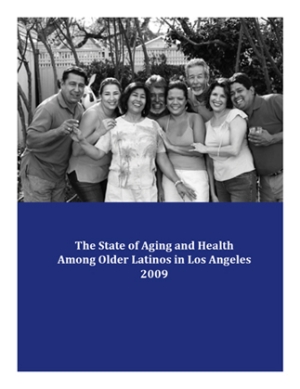Guarding the Health of Elder Latinos
July 13, 2009- Research
The Los Angeles Partnership for Evidence-Based Solutions in Elder Health, chaired by Maria P. Aranda of the USC School of Social Work and the USC Davis School of Gerontology, has released a Call to Action report that provides a snapshot of health priorities facing Los Angeles' Latino elders and a generation of baby boomers who will reach age 65 in the next 20 years.
The Call to Action highlights the health and well-being of older Latinos and how poor lifestyle behaviors are the primary contributors to death, reduced quality of life and loss of independence. It also focuses on the emergence of chronic health and social conditions in the community, including the rising number of Latinos with Alzheimer disease, the impact of depression on quality of life and the growing economic insecurity.
The first of the baby boomers (those born between 1946 and 1964) will reach age 65 in 2011. By 2030, more than 740,000 Latinos in Los Angeles will be older than 65.
"The presence of two or more chronic conditions is rising among older adults and can result in significant disability, social isolation and loss of independence. It can also place family members at risk for health problems related to the demands of caregiving," said Laura Trejo, general manager of the City of Los Angeles' Department of Aging and leader of the coalition of public agencies and aging services network that prepared the Call to Action.
Among older Latinos, the prevalence of lifestyle-related health conditions remains high. According to the 2005 and 2007 California Health Interview Surveys, 70 percent of older Latinos in Los Angeles are overweight or obese, almost 30 percent have diabetes, 36 percent have cholesterol, 55 percent have high blood pressure and 58 percent have arthritis. Many of these conditions are preventable with lifestyle changes.
The Call to Action highlights health issues related to arthritis, brain health, depression, diabetes and osteoporosis. Among them are the following recommendations:
• Ensure that newly diagnosed patients and their caregivers are educated about the disease in their primary language with age-appropriate and culturally sensitive information.
• Promotion of physical activity through engagement in social activities in community centers and organization as a way to treat, prevent and delay the onset of aging diseases. Employers may provide exercise space at work, health food options in company owned cafeterias and vending machines, and walking meetings.
• At the community level, neighborhoods and local businesses should improve opportunities for healthier eating and exercise among Latino elders by improving neighborhood infrastructure, i.e. access to health foods and parks and recreation centers.
"Absent policy and program interventions that reverse this pattern of health and economic vulnerability, future generations of Latino older persons and their families will continue to experience the same level of disparities which hold major consequences for well-being and quality of life," said Valentine M. Villa, director of the Applied Gerontology Institute, CSULA/UCLA, who earned her doctorate in gerontology/public policy from USC.
The Los Angeles Partnership for Evidenced-Based Solutions in Elder Health came together in 2007 as a result of a call to action by agencies of the U.S. Department of Health Human Services. The partnership is led by Aranda, associate professor at the USC School of Social Work and USC Davis School of Gerontology, and its members represent an array of community based organizations, academic institutions, health care providers and other key leaders.
The Call to Action was prepared in response to the activities completed as a result of the partnership between five federal agencies, including the Administration on Aging, the Agency for Healthcare Research and Quality, the Centers for Disease Control and Prevention, the Centers for Medicare and Medicaid Services and the Health Resources and Services Administration.
The goal was to help local cities develop coordinated strategies for improving the health and well-being of at-risk populations. Los Angeles was selected as one of the cities to participate in this project. Other cities selected included New York City, Chicago, San Diego, Miami, Houston, Lower Rio Grande Valley (Texas) and San Antonio.
The full text of "The State of Aging and Health Among Older Latinos in Los Angeles" can be viewed here:
To reference the work of our faculty online, we ask that you directly quote their work where possible and attribute it to "FACULTY NAME, a professor in the USC Suzanne Dworak-Peck School of Social Work” (LINK: https://dworakpeck.usc.edu)
